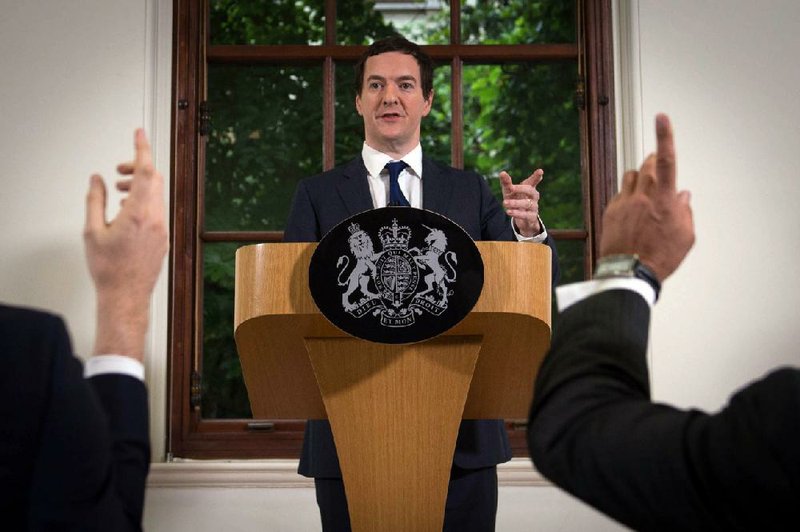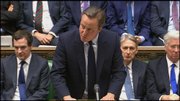LONDON -- Prime Minister David Cameron insisted Monday that Britain's vote to leave the European Union won't send the economy into a tailspin, even as the country was stripped of its top credit rating and stock markets and the pound continued a downward spiral.
Calling the vote a "seminal event" that "will lead to a less predictable, stable and effective policy framework in the U.K.," Standard & Poor's knocked the U.K.'s sovereign rating by two notches, from AAA to AA. Hours later, Fitch Ratings followed suit, downgrading the country to AA, from AA+.
Both agencies said they were keeping a negative outlook on their ratings, which means they could downgrade the country further. Standard & Poor's cited risks to the economy and public finances, the pound's role as an international reserve currency and "risks to the constitutional and economic integrity of the U.K." as Scotland's strong vote to remain in the EU could raise the prospect of another referendum on Scottish independence.
Speaking earlier in the day as the House of Commons met for the first time since last week's referendum, Cameron insisted the British economy was robust and could withstand the shock waves.
"It is clear that markets are volatile, there are some companies considering their investments and we know this is going to be far from plain sailing," Cameron, who campaigned on the "Remain" side, told lawmakers. "However, we should take confidence from the fact that Britain is ready to confront what the future holds for us from a position of strength."
Amid signs the uncertainty was hitting business confidence, a leading business group said 20 percent of its members planned to move some of their operations out of the U.K. The Institute of Directors said a survey of its 1,000 members showed three out of four believe Britain's exit from the EU will be bad for business. About a quarter said they would freeze hiring, and 5 percent said they would cut jobs.
"Ultimately we think that our members are very resilient, we think that British business is tough and will adapt, but certainly at the moment there is a lot of nervousness," said Edwin Morgan, the head of media relations.
The pound hit a new 31-year low Monday, dropping another 3.5 percent to $1.3199, while stock markets declined across Europe. Bank shares were particularly hard hit. Shares in Royal Bank of Scotland, once the world's largest bank and now mostly state-owned after a taxpayer bailout in 2008, closed 15 percent lower after dropping by as much as 25 percent.
Treasury chief George Osborne pledged not to impose a new austerity budget -- even though he warned earlier that would be necessary if the "Leave" side prevailed -- saying the next budget would be the task of Cameron's successor.
Osborne said he was working closely with Bank of England Gov. Mark Carney, fellow finance ministers and international organizations, and "we are prepared for whatever happens."
Exit talks to wait
Despite the uncertainty fueling financial instability, leaders in both Britain and the EU signaled there would be no immediate start to negotiations on an EU exit.
German Chancellor Angela Merkel met with her French and Italian counterparts and said "we agree there will be no formal or informal talks" until the British government officially declares its intention to quit by invoking Article 50 of the EU treaty.
The statement appeared to scotch hopes by Conservative lawmaker Boris Johnson and his Vote Leave campaign to hold preliminary talks on the general outlines of a deal before Article 50 of the EU treaty triggers a two-year countdown to a British exit.
Earlier, Merkel said she understood that Britain may need "a certain amount of time to analyze things" but that a "long-term suspension" of the question wouldn't be in either side's economic interest.
Cameron announced last week that he would resign by the fall after failing to persuade a majority of voters to back continued EU membership, saying his successor should be the one to navigate Britain's departure from the EU.
Cameron also said he made plain it was not yet time to start the process when he discussed the matter with Merkel and French President Francois Hollande.
"We have discussed the need to prepare for the negotiations and in particular the fact that the British government will not be triggering Article 50 at this stage," he said.
The Conservative Party will announce its successor to Cameron by Sept. 2, party managers said. Nominations will open Wednesday and close at noon Thursday, Graham Brady, chairman of the Conservative lawmakers' administrative panel told reporters Monday in London.
If there's only one candidate, the new prime minister will be known immediately, he said. If there are two candidates, they'll be put to a vote of party members. If there are more, House of Commons lawmakers will whittle the contestants down to two, and then put the names to the wider party in a national ballot.
Also Monday, Cameron led an emergency Cabinet meeting and announced the formation of a special civil-service committee to oversee talks on the British exit.
"Leave" campaigners haven't set out what relationship Britain should have with the bloc: whether to try to remain in the EU's single market in return for accepting its rules, or a looser arrangement that could see trade tariffs imposed on Britain. The financial markets' jitters are due in part to this uncertainty.
Cameron said there was "a very strong case" for trying to remain in the single market -- "but that's going to be a decision for the new government and for the Parliament."
The referendum left Britain deeply divided, and some among the 48 percent of voters who wanted to stay in the EU were pushing for a second referendum.
Cameron said that won't happen.
The vote was "not the outcome that I believe is best for the country I love," he said, but it has to be respected.
Kerry calls for calm
U.S. Secretary of State John Kerry met top officials from the EU and Britain on Monday, telling both sides to act responsibly as they start to figure out how to make good on British voters' decision to leave the bloc.
He also traveled to NATO, saying it would soon have to play a bigger role promoting trans-Atlantic unity.
In Brussels and London in a span of just hours, Kerry made his pitch for calm in the context of rattled global markets and fears that citizens and nations across the European continent could fall sway to a wave of populist sentiment and follow Britain's lead.
Kerry's primary goal was reassurance. He called the EU an essential partner of the United States in providing security and stability around the world. And he hailed America's "special relationship" with the U.K., which he said would remain as strong as ever.
"It is absolutely essential that we stay focused on how, in this transitional period, nobody loses their head, nobody goes off half-cocked, people don't start ginning up scatterbrained or revengeful premises," Kerry said after meeting European Commission President Jean-Claude Juncker and the bloc's foreign policy chief, Federica Mogherini.
Instead, he said everyone needs to "look for ways to maintain the strength that will serve the interests and the values that brought us together in the first place."
In the British capital, Kerry was blunt about the U.S. hope that Britain would have voted to remain in the 28-nation bloc. But he emphasized that the U.S. and Britain -- as nations that fought side-by-side to defeat fascism in World War II 75 years ago, defended Europe over almost a half-century of the Cold War and battled ethnic cleansing in the Balkans a generation ago -- would remain ironclad allies.
Labor pains
Meanwhile, U.K. opposition leader Jeremy Corbyn faced further upheaval within his Labor Party on Monday after more than 20 advisers quit his inner circle, calling on him to resign.
Corbyn insisted he would not step down, maintaining he still retains grassroots party support.
Many Labor lawmakers accuse Corbyn of running a lukewarm campaign in support of remaining in the EU. They also fear the left-winger cannot win a general election, which could come in the fall if Cameron's successor calls an early election to solidify a mandate before negotiating Britain's EU exit.
Labor spokesmen on business, energy and pensions all resigned from the shadow Cabinet on Monday along with at least 25 others, adding to 12 departures on Sunday. A no-confidence motion, tabled last week by Ann Coffey and Margaret Hodge, will be voted upon today.
"You are not the right person to lead the party," shadow business secretary Angela Eagle, the most senior Labor figure to desert Corbyn, wrote in her resignation letter, posted on Twitter. "You have lost the confidence of colleagues, and you have struggled to win the confidence of our voters and the wider public."
In an effort to shore up his position, Corbyn announced 10 new appointments. Emily Thornberry was named as foreign-affairs spokesman, replacing Hilary Benn, whom he fired Sunday. Diane Abbott was appointed health spokesman to replace Heidi Alexander, who resigned over the weekend.
Corbyn met with Deputy Leader Tom Watson on Monday. Watson told Corbyn that he's lost his authority in the parliamentary party, while stopping short of calling for him to quit, the Guardian newspaper reported. Corbyn became leader in September with the backing of party members, but little support among Labor members of Parliament, many of whom now form the backbone of those disappointed in Corbyn's "Remain" push.
"I was elected by hundreds of thousands of Labour Party members and supporters with an overwhelming mandate for a different kind of politics." Corbyn said in a statement late Sunday. "Those who want to change Labour's leadership will have to stand in a democratic election, in which I will be a candidate."
The result of today's no-confidence vote is advisory only. To trigger a leadership election, at least 50 lawmakers must sign a letter supporting a rival candidate.
After Benn was sacked in the early hours of Sunday, 11 more members of Corbyn's team quit, one by one. The steady drip increased to a flow on Monday, with more than two dozen resignations. Energy spokesman Lisa Nandy and shadow work and pensions secretary Owen Smith issued a joint statement saying a leadership contest is "inevitable" and that Watson should steer the party as caretaker for now.
"I do not believe the Labour Party under your leadership is, or ever will be, in good enough shape to go to the public in an election and ask to serve them in government," Anna Turley, who quit Monday as civil society spokesman, said in her letter to Corbyn.
Information for this article was contributed by Jill Lawless, Danica Kirka and Geir Moulson of The Associated Press; by Griff Witte and Anthony Faiola of The Washington Post; by Alex Morales, Joe Mayes and Robert Hutton of Bloomberg News.
A Section on 06/28/2016


